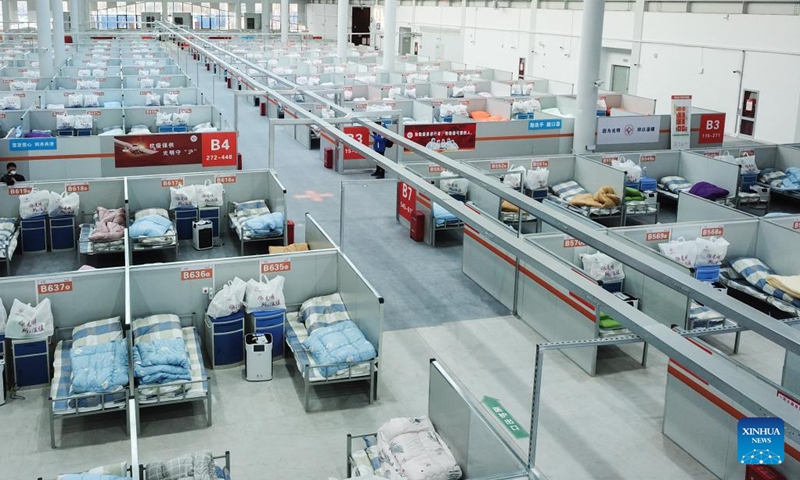
A makeshift hospital in Chongming of Shanghai Photo: Xinhua
Preparing permanent support hospitals, or Fangcang hospitals, a type of makeshift field hospital that accepts COVID-19-infected patients during the epidemic, is not a signal of worsening epidemic, national health officials explained at a press conference on Monday.
Guo Yanhong, a senior official from the National Health Commission, made the remarks when questioned over the permanent support hospitals, which is a public concern recently.
Ma Xiaowei, Director of the National Health Commission, previously revealed that China plans to build permanent facilities and more COVID-19 test sites to enhance the country's ability to prevent and control the coronavirus at the early stage of infection.
"First, I want to stress that the construction of permanent support hospitals is not a decision made because of a worsening epidemic but based on the characters of the Omicron variant which spreads fast, easily infects people and causes less severe disease," Guo explained.
Once released, the variant could cause a large number of infections in a short period. In order to receive and treat these patients as soon as possible, we designate them to different facilities according to the severity of their disease: mildly ill patients and asymptomatic virus carriers could be sent to support hospitals, and the others transferred to designated hospitals, which would help avoid overload of medical resources, according to Guo.
These permanent support hospitals will be used as fundamental facilities and can be set to receive patients in 24 hours once an outbreak occurs, according to Guo.
Under the situation of normalized epidemic prevention and control, preparing a certain number of support hospitals can rapidly expand the number of beds in the shortest time and reduce the occupation of normal medical resources, Guo said.
On the other hand, it can ensure every patient is treated in a very short period of time and can also coordinate the prevention and control of the epidemic and normal medical services, which not only ensures the treatment of the novel coronavirus, but also guarantees the supply of normal medical services for our people, Guo noted.
Ma unveiled the emphasis and blueprint to curb the virus in the long run, including building permanent support facilities, in an article published in the Communist Party of China Central Committee's flagship magazine, Qiushi Journal, on May 16.
He noted that "if China did not put efforts and resources into preventive measures, the country would face a large number of infections, huge pressure on treatment and risks to the lives of vulnerable people, including patients with underlying conditions, the elderly, children and pregnant women. The development of the economy and society would also be seriously affected. This is something the Chinese people and the Chinese government will never allow to happen."




